Never done a Penny Poll? This simple activity is one way to have more interaction with passers-by about government spending priorities. It challenges each of us to think about how tax dollars are being spent and how we would like them spent.
- Set up penny polls on tax day outside the IRS or post office — or publicly at any time of year on college campuses or in libraries, at peace fairs, conferences, and downtown plazas.
- Send out poll results in press releases to local media and you can post them on websites.
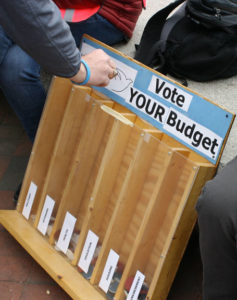
Boston Penny Poll on tax day 2018
How do you do a Penny Poll?
- Although called a “penny poll” some groups use nickels, others use beans instead of coins.
- Some groups use cups or cut down plastic bottles to collect the coins or beans; some use an assortment of jars; some use matching jars. Others have a member with design and carpentry skills who builds a frame for plastic tubes.
- The categories on the War Resisters League pie chart serve as labels for the jars or tubes for some groups; others like to add more specific categories and make an even split with 10 categories and 10 pennies representing one tax dollar.
The photos may give you more ideas on how to construct your very own Penny Poll. Use your imagination and the resources at hand. Also, see the blog for New York City’s Granny Peace Brigade and their “Ms.Gizmo” for their fancy set up and polling stories.
Austin, Texas
In Austin, Texas, our counter-recruitment group, Sustainable Options for Youth (SOY) always includes the Penny Poll in our “t-shirt challenge” when we table in the high schools. We ask students to respond to a series of questions, such as “what are the 5 basic First Amendment freedoms?” or “where is your school mascot animal found in the wild, and what are some threats to its existence?” We ask them to find
certain countries on the globe and write down their ideas about preventing war. There’s a Peace Wheel of Fortune and a chin-up bar, suggesting that peace takes strength, too.
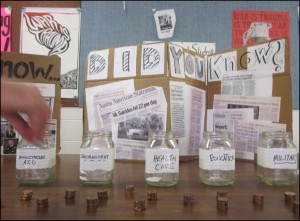
We appreciate seeing how seriously most students approach the challenge. When they walk up to the Penny Poll, they deliberate carefully before distributing 10 pennies among the 5 jars. Over the last semester, in 7 school visits, 234 students voted for 30% of the federal budget to go toward Education, 24.5% for Health Care, 19% for the Environment, 14.8% for the Military and 11.7% for Humanitarian Aid. Lately, we’ve been tweeting the Penny Poll results to the schools’ twitter accounts as we tally up. During our last school visit, one student who unfolded the AFSC’s “One Minute for Peace” graph after she had voted in the Penny Poll said, “Nuclear Weapons? We don’t need those!” Kids should have a voice, and the Penny Poll is a great interactive exercise that can be used year-round.
Ithaca, New York
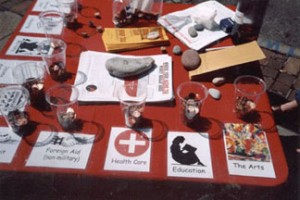
People were given ten pennies to distribute in the way they would like to see their tax dollars spent. 58 people participated in the poll that lasted from 12–2pm (in addition to passing out literature). The following are the results of what people, who took the poll, would spend their money on:
- Health Care—22.8%
- Education—16.9%
- Environment—12.3%
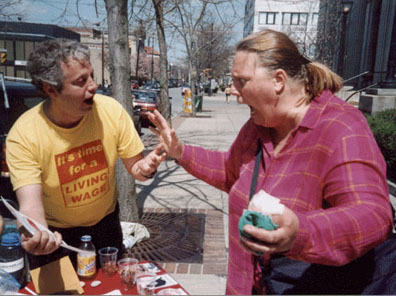
Expect shock when passers by see how their tax dollars are being spent by the government. Photo by Mary Loehr.
- Mass Transit—9.8%
- Income Assistance—9.5%
- Arts—9.0%
- Housing—9.0%
- Foreign Aid (non military)—5.5%
- National Debt—2.8%
- Military—2.4%
Princeton, New Jersey

A child puts pennies into a penny poll in Princeton, New Jersey.
The Coalition for Peace Action conducted their annual penny poll in front form the Princeton post office from noon to 1:30. Each of 107 participants were given 10 pennies to distribute in 5 categories. The results were:
Education 30%
Health Care 24%
Environment 21%
Housing 18%
Military 6%
Photos from Other Cities
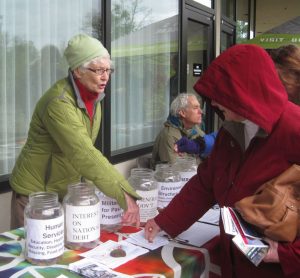
Carol Van Hooten staffing penny poll. Eugene, Oregon, Tax Day 2018.
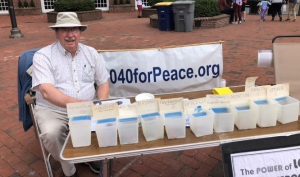
Penny Poll in Lancaster for Tax Day 2022.
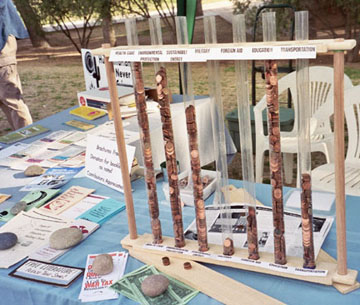
Transparent cylinders hold stacks of pennies which makes it easy to see which stacks people prefer. Tucson, Arizona.
Readings on Money
Readings on Money — See the “On Money” section, which includes:
“War Tax Resisters Talk About Money” A discussion from a gathering a few years back
“The Influence of Money on Decisions to Engage in War Tax Resistance” Karen Marysdaughter
“Inheritance and Social Responsibility” George Salzman
“On Interest” Juanita Nelson; “Interest and Economic Transformation” Bob Irwin; “Rejoinder” Juanita Nelson
“War, the National Debt, Taxes, and the Creation of Money” Jay Sordean
Nonprofits and Tax Exempt Status: “All Saints vs. the State” Matt Vogel; “Your Gifts Are Not Tax-Deductible” Shelley Douglass; “War Tax Resistance and Tax Exempt Status” Excerpt from NWTRCC’s Practical War Tax Resistance #6
